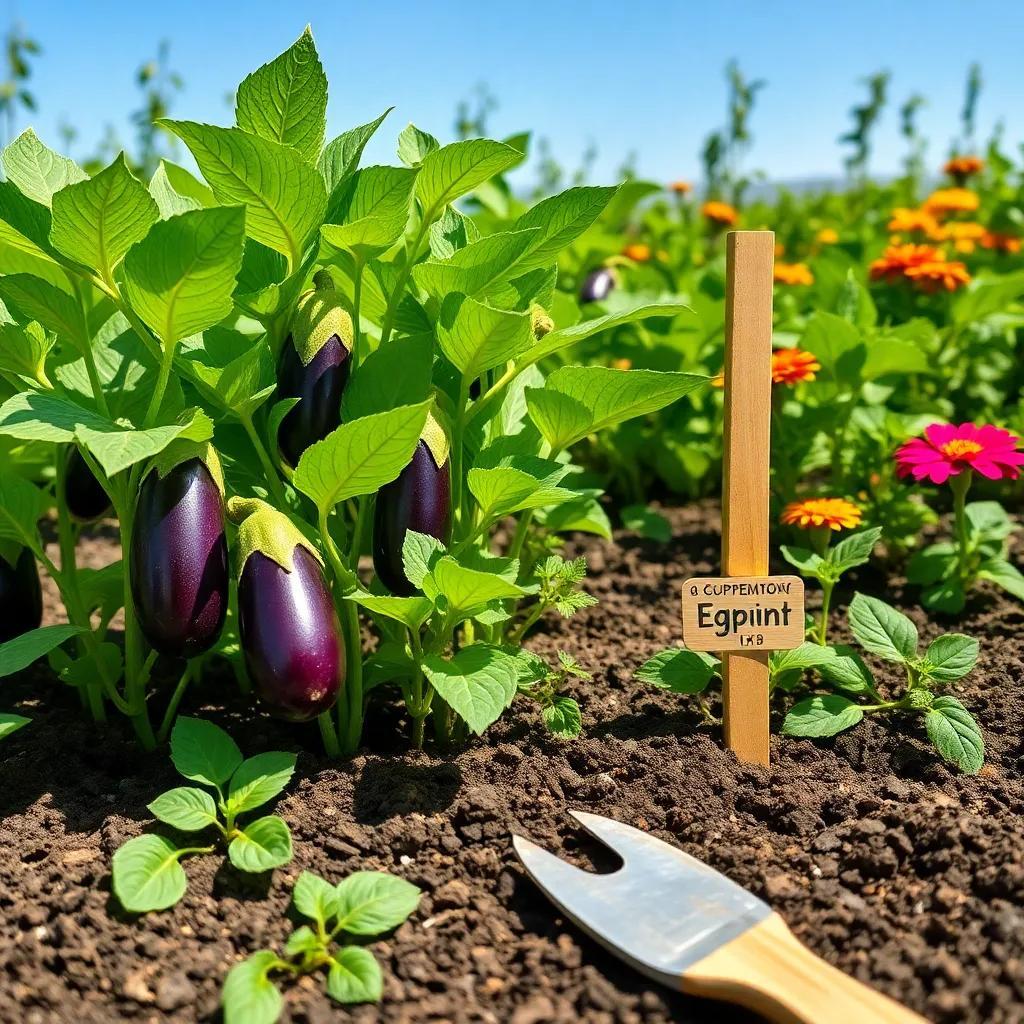Are you ready to grow some delicious eggplants in your garden? There’s something magical about planting seeds, watching them sprout, and eventually enjoying a fresh harvest! Join me as we explore all the tips and tricks you need for a fruitful eggplant-growing adventure—let’s dig in!
Factors to Consider When Planting Eggplant Seeds
Growing eggplants can be an exciting adventure, and there are several factors I always keep in mind before planting those little seeds! Getting these right can make a big difference in how well my plants grow. Let’s dive into what I think are the most important things to keep track of!
- Climate: Eggplants love warm weather! They do best when the temperatures are between 70-85°F (21-29°C). So, check your local weather and wait until the last frost date has passed before you plant. Trust me, your eggplants will thank you!
- Location: Sunlight is your plant’s best friend! Find a spot in your garden that gets 6-8 hours of direct sunlight each day. Eggplants adore the sun, and the more light they get, the better they will grow!
- Soil Quality: Think of the soil as your plants’ comfy home! Eggplants prefer well-draining soil with a pH level around 5.5 to 6.5. It’s like choosing a cozy bed; nobody wants to sleep on a lumpy mattress! Mix in some organic matter like compost for extra nutrition.
- Spacing: You wouldn’t want to live in a cramped apartment, right? Eggplants need space to breathe! They typically grow up to 24-36 inches tall and spread 18-24 inches wide. Make sure to give them some room to stretch out!
- Companion Planting: Some plants are like best buddies! Planting herbs like basil or marigold next to eggplants can help keep pesky bugs away. Just avoid planting them near other nightshades like tomatoes; it’s like two siblings in the same room—chaotic!
By keeping these factors in mind, I set my eggplants up for a healthy and happy growing season! Happy planting!
Recommended Soil Depth for Eggplant Seeds
Now that we’ve covered the factors to consider, let’s talk about soil depth! This part is super important because it can affect how well your seeds germinate. I always remember that eggplant seeds like to be planted a bit on the shallow side, and here’s why!
Eggplant seeds should be sown at a depth of about ¼ to ½ inch (0.6 to 1.3 cm). This allows them to push through the soil easily, and they’ll get the light they need to grow strong. Planting them too deep can make things tricky! Here’s a quick guide for planting:
- Before Planting: Make sure your soil is nice and loose! It should be free from big clumps or rocks. Rake it out smooth like a freshly made bed.
- Spacing the Seeds: Follow the recommended spacing for eggplants. This will give each little seed enough room to grow without bumping into its neighbors.
- Covering the Seeds: Lightly cover the seeds with a thin layer of soil, about twice the diameter of the seed itself. It’s like tucking them in for a good night’s sleep!
- Soil Type: If your soil is heavy clay, plant the seeds a bit shallower to avoid waterlogging. Or if you have sandy soil, you might want to plant them a tad deeper to keep moisture in.
After planting, gently press the soil down to ensure good contact. This helps the seeds absorb moisture better. And remember to keep an eye on the soil moisture! With this simple approach, I’ve had fantastic results with my eggplant seeds, and I bet you will too! Happy planting!

Essential Tips for Successful Germination
So, you’ve planted your eggplant seeds and you’re excited to see them sprout! Now comes the fun part—ensuring they germinate successfully! I’ve learned a few tips along the way that really help boost the chances of those little seeds popping through the soil. Let’s dig in!
- Keep Soil Moist: Eggplants love consistent moisture. It’s like giving them a nice drink! Water the soil regularly, but don’t drown them—overwatering can lead to problems like root rot. I like to use a misting nozzle or a gentle watering can to avoid disturbing the seeds.
- Temperature Matters: Eggplants are big fans of warm weather! The soil should ideally be around 70-85°F (21-29°C) for the best germination. If it’s too cold, your seeds might just sit there, waiting for some warmth. Consider using a seedling heat mat if you’re starting them indoors!
- Light, Light, Light: Once the seedlings begin to sprout, they’ll need plenty of sunlight. If you’re growing them indoors, place them in a sunny window or use grow lights to give them that extra boost of energy!
- Protect from Harsh Weather: If you live in an area with unpredictable weather, be prepared! Use row covers or cloches to shield your new seedlings from heavy rain or frost.
- Patience is Key: Germination usually takes about 7-14 days, so don’t worry if they don’t pop up overnight! Just keep an eye on the moisture and give them some love.
With these tips, your eggplant seeds will have a higher chance of thriving, and soon you’ll see those tiny plants sprouting with joy! Happy gardening!
Common Mistakes to Avoid When Planting Eggplant Seeds
As I’ve learned through trial and error, growing eggplants can come with its own set of challenges. Avoiding common mistakes can save you a lot of frustration and help your plants thrive! Here are the big ones I keep in mind:
- Planting Too Deep: This is a classic blunder. Planting seeds deeper than ¼ to ½ inch can hinder their ability to break through the soil. Stick to the recommended depth for the best results.
- Overwatering: I totally get it—keeping the soil moist is important, but overwatering can lead to root rot. Always check the soil moisture before watering. If it feels damp, it’s probably fine!
- Cold Soil: Eggplants aren’t fans of the cold! If you plant them when the soil is too chilly, they may refuse to germinate. Make sure the soil temperature is warm enough before planting those seeds.
- Crowding: Giving your plants enough space is essential. If you plant them too close together, they’ll compete for sunlight and nutrients. Always follow spacing guidelines to keep your plants healthy.
- Ignoring Pests: Be on the lookout for pests and diseases! Regularly check for signs of trouble, and take action right away to protect your precious plants. I like to use natural deterrents like neem oil or introduce beneficial insects!
By avoiding these common pitfalls, you’ll be well on your way to growing a beautiful crop of eggplants. Trust me, your plants will thank you for all the love and care you give them!
Frequently Asked Questions About Eggplant Seed Planting
You’ve got questions, and I’ve got answers! Here are some frequently asked questions I hear about planting eggplant seeds. Let’s tackle them together!
Q: What is the best depth to plant eggplant seeds?
A: The best depth is about ¼ to ½ inch. This allows the seeds to get the light they need to sprout!
Q: How can I ensure that I’m planting seeds at the right depth?
A: Use a ruler or a planting tool to measure the depth when you plant. It’s a simple way to double-check!
Q: Can I plant eggplant seeds too deep?
A: Absolutely! If they are planted too deep, they may struggle to sprout and reach the surface for light.
Q: What happens if I plant seeds too shallow?
A: Planting too shallow may expose the seeds to drying out or getting washed away by rain. Make sure to cover them properly!
Q: How long does it take for them to sprout?
A: It usually takes about 7 to 14 days for eggplant seeds to sprout, depending on soil temperature and moisture conditions. Patience is key!
With these answers, I hope your eggplant planting journey becomes a bit easier! If you have more questions, feel free to reach out! Happy gardening!

